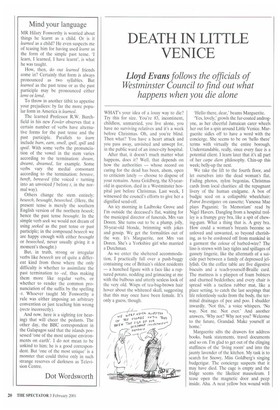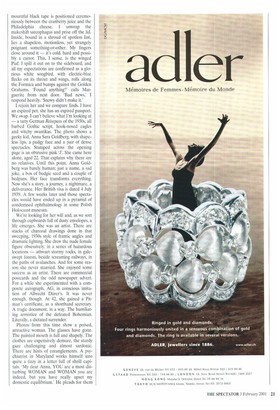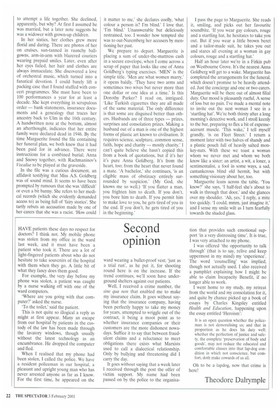DEATH IN LITTLE VENICE
Lloyd Evans follows the officials of
Westminster Council to find out what happens when you die alone
WHAT's your idea of a lousy way to die? Try this for size. You're 83, incontinent, childless, unmarried, you live alone, you have no surviving relatives and it's a week before Christmas. Oh, and you're blind. Then what? You have a heart attack and you pass away, unvisited and unwept for, in the public ward of an inner-city hospital.
After that, it doesn't much matter what happens, does it? Well, that depends on how the authorities — whose record on caring for the dead has been, ahem, open to criticism lately — choose to dispose of your remains. Anna Goldberg, the 83-yearold in question, died in a Westminster hospital just before Christmas. Last week, I witnessed the council's efforts to give her a dignified send-off.
An icy morning in Ladbroke Grove and I'm outside the deceased's flat, waiting for the municipal director of funerals, Mrs van Doren. She turns out to be a plump, jolly, 50-year-old blonde, brimming with jokes and gossip. We get the formalities out of the way. It's Marguerite, not Mrs van Doren. She's a Yorkshire girl who married a Dutchman.
As we enter the sheltered accommodation, I practically fall over a push-buggy containing one of Britain's oldest residents — a hunched figure with a face like a niptured potato, nodding and grimacing at me with the bulbous and utterly sexless look of the very old. Wisps of tea-bag-brown hair hover about the whitened skull, suggesting that this may once have been female. It's only a guess, though. 'Hello there, dear,' beams Marguerite.
'Yes, lovely,' growls the fur-coated androgyne, as her cheerful Jamaican carer wheels her out for a spin around Little Venice. Marguerite sidles off to have a word with the concierge. She seems to be on 'hello there' terms with virtually the entire borough. Understandable, really, since every face is a potential client. I learn later that it's all part of her carpe diem philosophy. Chin-up this week; belly-up the next.
We take the lift to the fourth floor, and let ourselves into the dead woman's flat. Fading photos, nylon begonias, Christmas cards from local charities: all the repugnant livery of the human endgame. A box of budgie seed on a collapsible wheelchair; Poirot Investigates on cassette; Vanessa Mae plays Paganini; 'In Memoriam' read by Nigel Havers. Dangling from a hospital trolley is a frumpy grey bra, like a spit of chewing-gum. What a thing that is. A grey bra. How could a woman's breasts become so unloved and unwanted, so beyond cherishing, as to be cordoned off from mankind in a garment the colour of barbed-wire? The lino is strewn with lacy tights and spillages of gussety lingerie, like the aftermath of a suicide pact between a family of depressed jellyfish. On the coffee table are five digestive biscuits and a teach-yourself-Braille card. The mattress is a playpen of foam bolsters and churned bedclothes; and every chair is spread with a tactless rubber mat, like a place setting, to catch the last seepings that life relentlessly sucks from the body, the terminal drainages of pee and poo. I shudder inwardly. 'Not this,' a voice whispers. 'No way. Not me. Not ever.' And another answers, 'Why not? Why not you? Welcome to the future, Grandad. Make yourself at home.'
Marguerite sifts the drawers for address books, bank statements, travel documents and so on. I'm glad to get out of the clinging stuffiness of the 'living room' and into the jaunty lavender of the kitchen. My task is to search for Snowy, Miss Goldberg's singing budgerigar. The concierge suspects that it may have died. The cage is empty and the fridge seems the likeliest mausoleum. I tease open the magnetic door and peep inside. Aha. A neat yellow box wound with mournful black tape is positioned ceremoniously between the cranberry juice and the Philadelphia cheese. I unwrap the makeshift sarcophagus and prise off the lid. Inside, bound in a shroud of spotless lint, lies a shapeless, motionless, yet strangely poignant something-or-other. My fingers close around it — its cold, hard and possibly a carrot. This, I sense, is the winged Piaf. I spill it out on to the sideboard, and all my expectations are confirmed as a glorious white songbird, with electric-blue flecks on its throat and wings, rolls along the Formica and bumps against the Golden Grahams. 'Found anything?' calls Marguerite from next door. 'Bad news,' I respond heavily. 'Snowy didn't make it,'
I rejoin her and we compare finds. I have an expired pet; she has an expired passport. We swap. I can't believe what I'm looking at — a tatty German Reisepass of the 1930s, all barbed Gothic script, hook-nosed eagles and witchy swastikas. The photo shows a geeky kid, Anna Sara Goldberg, with shapeless lips, a pudgy face and a pair of dense spectacles. Stamped across the opening page is an obtrusive pink 'Y. She came here alone, aged 22. That explains why there are no relatives. Until this point, Anna Goldberg was barely human; just a name, a sad joke, a box of budgie seed and a couple of bedpans. Her face transforms everything. Now she's a story, a journey, a nightmare, a deliverance. Her British visa is dated 4 July 1939. A few weeks later and those spectacles would have ended up in a pyramid of condemned ophthalmology in some Polish Holocaust museum.
We're looking for her will and, as we sort through cupboards full of dusty envelopes, a life emerges. She was an artist. There are stacks of charcoal drawings done in that sweeping, 1930s style of frantic angles and dramatic lighting. She drew the nude female figure obsessively, in a series of hazardous locations — athwart stormy rocks, in galeswept forests, beside screaming railways, in the paths of avalanches. And for some reason she never married. She enjoyed some success as an artist. There are commercial postcards and the odd newspaper advert. For a while she experimented with a composite autograph. AG, in conscious imitation of Albrecht Diirer's. It was never enough, though. At 42, she gained a Pitman's certificate, as a shorthand secretary. A tragic document, in a way. The humiliating armistice of the defeated Bohemian. Literally, a dictated surrender.
Photos from this time show a poised, attractive woman. The glasses have gone. The painted mouth is full and shapely. The clothes are expensively demure, the sturdy gaze challenging and almost sardonic. There are hints of entanglements. A psychiatrist in Maryland works himself into quite a tizzy in a letter full of shrill capitals, 'My dear Anna, YOU are a most disturbing WOMAN and WOMAN you are indeed, but you have really upset my domestic equilibrium.' He pleads for them to attempt a life together. She declined, apparently, but why? At first I assumed he was married, but a later note suggests he was a widower with grown-up children.
In her sixties, her clothes grew more florid and daring. There are photos of her on cruises, sun-tanned in raunchy ballgowns, arm-in-arm with blazered couriers wearing prepaid smiles. Later, even after her eyes failed, her hair and clothes are always immaculate. She discovered a love of orchestral music, which turned into a fanatical devotion. I could barely lift a packing case that I found stuffed with concert programmes. She must have been to 100 performances a year for at least a decade. She kept everything in scrupulous order — bank statements, insurance documents and a genealogy that traces her ancestry back to Ulm in the 16th century. A handwritten note at the bottom, almost an afterthought, indicates that her entire family were declared dead in 1946. By the time Marguerite found the file containing her funeral plan, we both knew that it had been paid for in advance. There were instructions for a combined burial; Anna and Snowy together, with Rachmaninov's Vocalise to be played at the graveside.
In the file was a curious document, an affidavit testifying that Miss A.S. Goldberg was of sound mind. It seems to have been prompted by rumours that she was 'difficult' or even a bit barmy. She refers to her medical records (which she evidently demanded access to) as being full of 'fairy stories'. She tartly rebuts an accusation made by one of her carers that she was a racist. 'How could it matter to me,' she declares coolly, `what colour a person is? I'm blind.' I love that. 'I'm blind.' Unanswerable but deliciously restrained, too. I wonder how tempted she was to out-Nuremberg her accusers by mentioning her past.
We prepare to depart. Marguerite is placing a sum of under-the-mattress cash in a secure envelope, when I come across a scrap of paper that looks like one of Anna Goldberg's typing exercises. 'MEN' is the simple title. 'Men are what women marry,' it opens baldly. 'They have two arms and sometimes two wives but never more than one dollar or one idea at a time.' Is this Dorothy Parker? I read on, intrigued. 'Like Turkish cigarettes they are all made of the same material. The only difference is that some are disguised better than others. Husbands are of three types — prizes, surprises and consolation prizes. Making a husband out of a man is one of the highest forms of plastic art known to civilisation. It requires science, sculpture, common sense, faith, hope and charity — mostly charity.' I can't quite believe she hasn't copied this from a book of quotations, but if it's her it's pure Anna Goldberg. It's from the heart, too; from the heart that never found a mate. 'A bachelor,' she continues, is an eligible mass of obstinacy entirely surrounded by suspicion.' (My God, she knows me so well.) 'If you flatter a man, you frighten him to death. If you don't, you bore him to death. If you permit him to make love to you, he gets tired of you in the end. If you don't, he gets tired of you in the beginning.' I pass the page to Marguerite. She reads it, smiling, and picks out her favourite soundbite. 'If you wear gay colours, rouge and a startling hat, he hesitates to take you Out. But if you wear a little brown beret and a tailor-made suit, he takes you out and stares all evening at a woman in gay colours, rouge and a startling hat.'
Half an hour later we're in a Firkin pub on Westbourne Grove. It's the nearest Anna Goldberg will get to a wake. Marguerite has completed the arrangements for the funeral, which doesn't promise to be heavily attended. Just the concierge and one or two carers. Marguerite will be there out of almost filial duty. Our mood is pleasantly rueful. A sense of loss but no pain. I've made a mental note to invite out the next woman I see in a 'startling hat'. We're both thirsty after a long morning's detective work, and I stroll keenly to the bar, preparing to flex a bit of expenseaccount muscle. 'This wake,' I tell myself grandly, 'is on Fleet Street.' I return a moment later with two halves of shandy and a plastic pouch full of heavily salted monkey-nuts. With these we toast a woman whom we never met and whom we both know like a sister: an artist, a wit, a loner, a sentimentalist, a fool in some ways, a sad, cantankerous blind old hermit, but with something visionary about her, too.
Marguerite leans across the table. 'You know?' she says, 'I half-feel she's about to walk in through that door,' and she glances over my shoulder. `Ah, yes,' I reply, a mite too quickly. 'I could, mmm, just imagine it,' and I sense my smile wilt as I turn fearfully towards the shaded glass.




























































 Previous page
Previous page